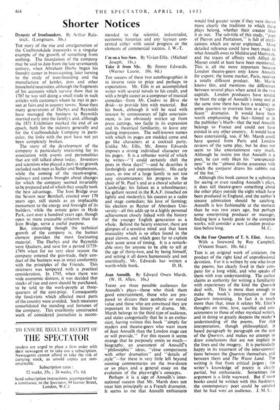Jean Anouilh. By Edward Owen Marsh. (W. H. Allen. 16s.)
THERE are three possible audiences for Anouilh's plays—those who think them good entertainment, those who are pre- pared to discuss their aesthetic or moral value and those who are convinced they are important in the history of drama. Mr. Marsh belongs to the third type of audience, and states categorically that he is an enthu- siast, having written this book "simply for readers and theatre-goers who want more of Jean Anouilh than the London stage can or will provide." For this reason it seems strange that he purposely omits so much— biography, an assessment of Anouilh's "philosophic" ideas, "close comparisons with other dramatists" and "details of .style"—for there is very little left beyond running commentaries on the two-dozen or so plays and a general essay on the evolution of the playwright's concepts. • Perhaps it is a sign of Anouilh's inter- national success that Mr. Marsh does not treat him principally as a French dramatist. It seems to me that Anouilh enthusiasts would find greater scope if they were shown more clearly the tradition to which these plays belong, whether their creator likes it or not. The sub-title of this study, "poet of Pierrot and Pantaloon," is full of impli- cations which are never explained., More detailed reference could have been made to what Anouilh owes to Moliere and Marivaux, and the traces of affinity with Alfred de Musset could at least have been mentioned. This is, all the more important because London theatre-goers only know Anouilh for export; the home market, Paris, receives a totally different product. Mr. Marsh knows this, and mentions the differences between several plays when acted in the two capitals. London producers have tended to blunt the edge of Anouilh's irony and at the same time there has been a tendency in some quarters to overrate him as a "signi- ficant" dramatist. It would have been worth emphasising the fact—hinted at in the publisher's blurb—that the real Anouilh belongs to France and could not have existed in any other country. It would have been entertaining, too, if Mr. Marsh could have quoted from Paris and London reviews of-the same play, but he does not seem to like entertainment very much. Although he insists too that Anouilh is a poet, he can only liken his "unexpected- ness" to the "almost divine assurance with which the conjuror draws his rabbits out of the hat."
Although this book cannot be a substitute for seeing or even reading Anouilh's plays, it does tell theatre-goers something about the other plays outside the eight which have been produced in England, and the author's sincere admiration should be catching. Anouilh is less fashionable at the moment than he was two years ago, but perhaps some enterprising producer or manager, finding here a handy guide to the complete works, will consider a new London produc-


































 Previous page
Previous page